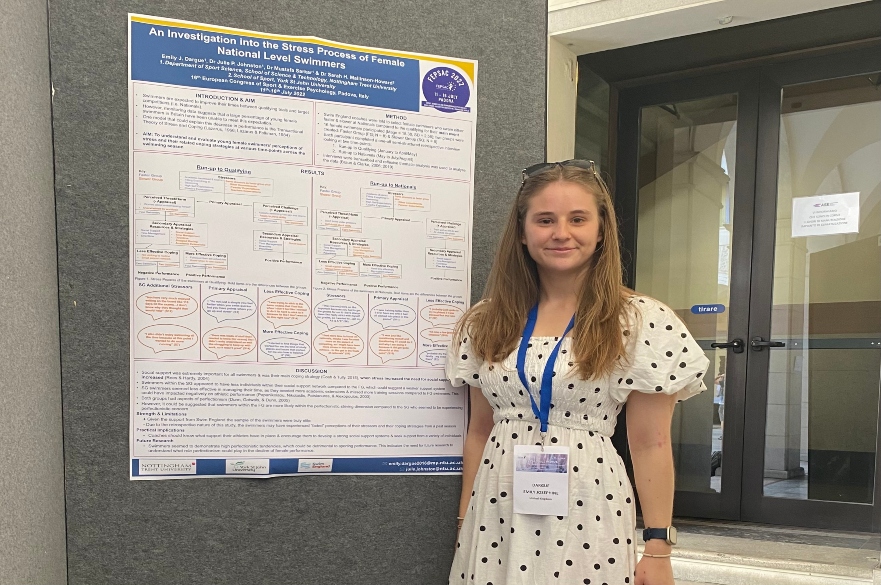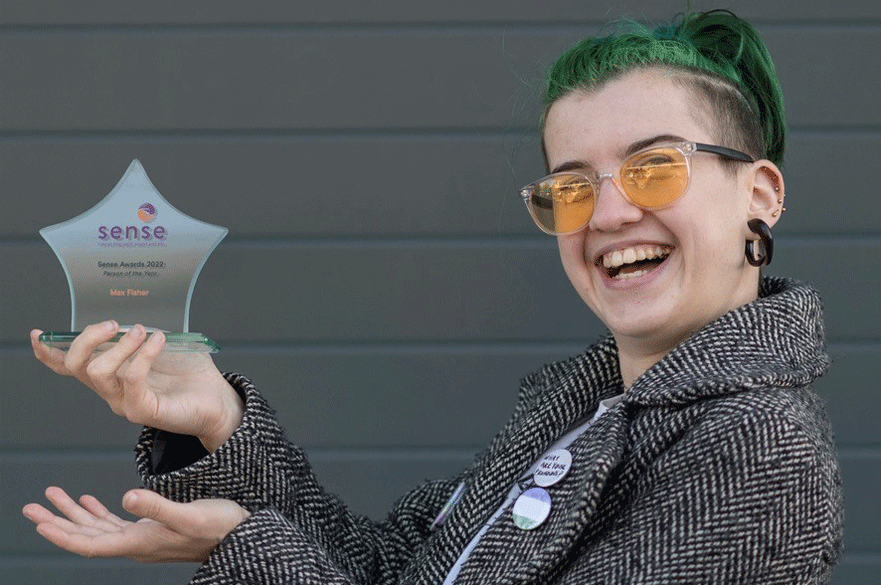More about Max
As the winner of the Person of the Year 2022 Sense award, Max Fisher is a truly inspiring NTU alum. Graduating in 2019, Max now leads an exciting scientific career after overcoming barriers surrounding their disability. As an undergraduate, Max studied BSc Pharmacology, before continuing their studies with a Masters in Pharmacology. We spoke to them about their NTU memories and the challenges they faced after graduation.
Tell us about your time as an NTU student…
I’m going to be honest, but let me preface it with I wouldn’t change a single thing! NTU was my insurance choice. I knew essentially nothing about NTU, or even Nottingham, and wasn’t able to visit until moving in day and yet it was the perfect fit.
NTU taught me that I am STRONG! My time at NTU taught me exactly what it meant to work hard, and to be in control of my own learning. I learned lots of practical lab skills, as well as lots about pharmacology and about other disciplines, such as genetics. I use my knowledge in Genetics every day at work now, despite saying “I don’t want to work in genetics”!
What are some of your favourite NTU memories?
I have hundreds of memories that make me smile - lots of them involve learning from mistakes. For example, accidentally making “unicorn tears” while doing a western blot! Very pretty, but not at all helpful assay-wise. I have very fond memories of student politics, representing NTSU at conferences, representing trans students as the Equality and Diversity Officer for gender, and being a part of societies. I also learned that I do in fact enjoy sports, I just needed to find one that was accessible for me as someone who lives with chronic pain.
Talk us through a typical day in your current role…
There is no such thing as a typical day in cell line engineering! In a single day I work with multiple cell lines with a mixture of gene edits, all requiring different culture media, care, and safety precautions. I start my day by waking up the lab - turning on water baths, cleaning my Microbiological Safety Cabinet, getting media and reagents out of the fridge. Then it’s a mix of cell culture and meetings for the rest of the day. I’ll look at cells and assess their health and confluence before I start taking care of each batch. The goal is to grow a few million cells so they can be a part of ground-breaking research all over the world.
What attracted you to this field of work?
I’ve always been interested in scientific research, especially as a disabled person with a small handful of rare diseases. As a cell line engineer, I can be a part of saving the world one cell line at a time, right at the heart of research. Cell biology presents opportunities for problem-solving every single day, and the thinking on my feet part of the job fills me with joy.
What have been the biggest highlights and challenges of your career so far?
The biggest challenge of my career so far has been actually getting the job. I faced discrimination during the job searching process, and was told by many people, potential employers, employment coaches, recruitment agencies and charities that I couldn’t be both DeafBlind and a scientist. I also deliberately took some time after I finished my MRes to focus on my health, and attend all the appointments I’d postponed because I was too busy studying. This really improved my health, so I had fewer barriers and could present a more stable version of myself to employers. Marketing myself on job applications was the very hardest part of my career, because nobody teaches you how to do it, and it’s far too easy to say the wrong thing!
There isn’t a single day where I don’t smile from ear to ear at work. The biggest highlights have been seeing where my cells go off to, and the wonderful research that they’re involved in. It’s always fascinating learning about new areas of research that aren’t in my usual field of interest. I have made some great friends along the way, and have had opportunities to keep learning new skills and be wholly valued in the work place as a queer, trans, disabled, DeafBlind scientist (which I was told would never happen!). I get to be my full self, and be valued for that. Pride month in the office this year was a blast.
What are your plans for the future?
I’m not 100% sure. I have found a line of work that I really enjoy, and I hope that I get to learn and experience all parts of it. I want to develop protocols relevant to cell line engineering, and streamline processes that already exist so that we can get the best out of each cell line, resulting in the best results for research. I hope to get a PhD one day, and create my own research.
If you had a time machine, what would you go back and tell yourself at uni?
If I had a time machine, I would go back and tell past-me what my diagnoses were. Having a label for what was going on in my body would have really helped me get the support that I deserved. Would it have helped me physically? Probably not, but I would have focused less on that, and more on studying.
I would tell myself to pay more attention in the genetics and immunology module! I would tell myself that it’s all going to be fine, and that being a cell line engineer is really cool. Oh, and to dye my hair green much sooner!
There’s so much I would tell myself, but that would be cheating. If I hadn’t gone through uni the way I did, I wouldn’t be as cool as I am now.
Is there anything else you’d like to share with our alumni community?
You can be a scientist and ANYTHING. I can’t think of a single thing that would rule somebody out of being a scientist, other than not wanting to be a scientist. We need to be way more open minded when it comes to welcoming people into the scientific community. The world needs to know that the barriers to science are mostly just stigma. Anything can, and should, be adapted. Anyone can, and should, be welcomed.
Follow Max on LinkedIn: https://www.linkedin.com/in/max-fisher-ba6142112/
Still need help?
-

STUDENT PROFILE
Blaine Dacre-Pearson
PhysicsUnited Kingdom
https://www.ntu.ac.uk/study-and-courses/courses/our-students-stories/science-technology/blaine-dacre-pearson
-

STUDENT PROFILE
Emily Dargue
Sport PsychologyUnited Kingdom
https://www.ntu.ac.uk/study-and-courses/courses/our-students-stories/science-technology/emily-dargue
-

STUDENT PROFILE
Jack Munday
PhysicsUnited Kingdom
https://www.ntu.ac.uk/study-and-courses/courses/our-students-stories/science-technology/jack-munday
